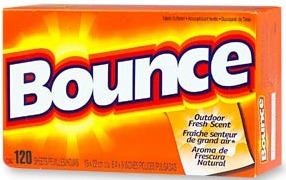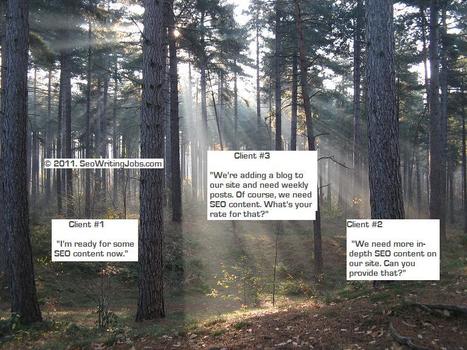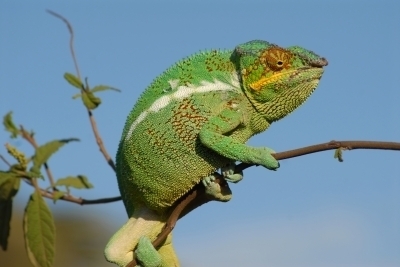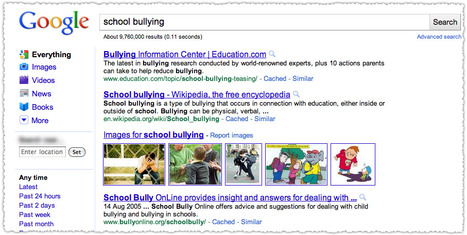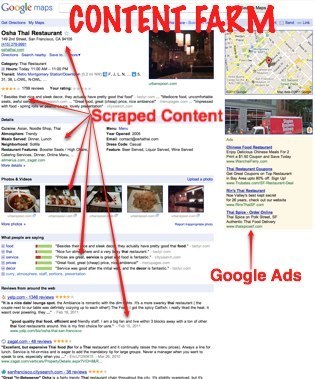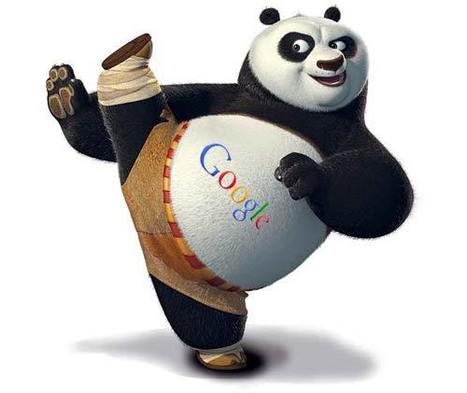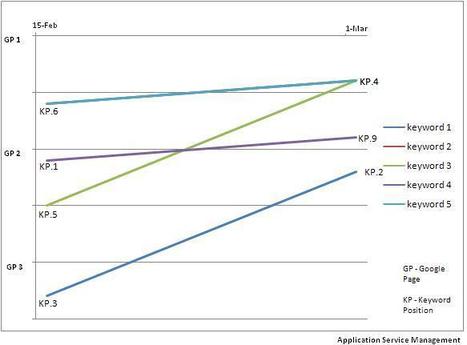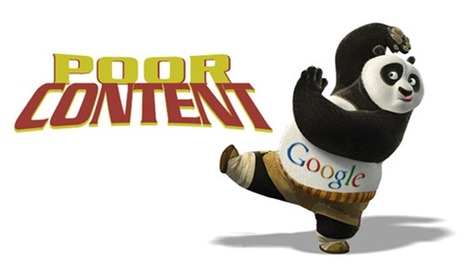 Your new post is loading...
 Your new post is loading...

|
Scooped by
Robin Good
April 1, 2011 6:09 AM
|
Remember how eHow launched its big redesign after the Panda update hit? They put a great deal more focus on feedback and social media. eHow told us Google’s changes didn’t influence the redesign, which has been in the works since well before Panda hit, but much of Demand Media’s focus these days does seem to be on becoming less and less dependent on Google (or search in general).
Well, clearly E-Commerce shop owners should have a similar goal. This may mean some redesigning.
Rob Snell, author of Starting a Yahoo! Business For Dummies, notes that while 1% of Yahoo Stores were impacted by Google’s Panda update, several large Yahoo Stores were on the widely publicized list of hardest-hit sites, published by Sistrix.
Snell listed the following as ten common mistakes that retailers are making in terms of SEO, or as he puts it, issues they “need to address” now to “protect themselves from major algorithm changes like Panda”:
1. Little Or No Original Product Text Content
2. Little Or No Original Category / Section Page Content
3. Same Template. Page After Page After Page
4. Really, Really, Really Big Boilerplate Text
5. Same Run Of Site Links On Every Single Page
6. Writing Unique Content But Giving It Away
7. Great Unique Content Buried On Pages Not In The Index
8. Unique Content Hidden From Spiders
9. Multiple Pages On The Same Domain With The Same Content
10. Competing against yourself with multiple sub-domains

|
Scooped by
Robin Good
April 1, 2011 3:55 AM
|
Although it was targeted toward sites lacking good content, many quality sites were also affected by Google's Panda update last February.
Now, over a month later, it appears Google has a reinclusion process in place.
Using a process similar to Google's site verification process, site owners will be able to be automatically re-included into the Google Search Results (SERP) by downloading a text file from their Webmaster Tools account. Google's crawlers will then return to those sites hit by Panda, consume the Bamboo, and reverse the effects the hungry Panda update caused.

|
Scooped by
Robin Good
April 1, 2011 1:06 AM
|
Many webmasters still look at this metric as a ranking value and they really need to dispel this myth. Bounce rate as defined by Google is the percentage of single-page visits or visits in which the person left your site from the entrance (landing) page. In fact, bounce rate can be skewed in several ways, let’s take a close look at some facts;

|
Scooped by
Robin Good
March 31, 2011 2:32 AM
|
It's no secret that the Internet has changed the news business forever. While some outlets, like The New York Times, struggle to find a way to adapt their business model to the Web, others that were born in the new era are thriving.
Demand Media, which employs freelancers to write and produce down-and-dirty articles based on trending keywords, is a huge success. This graphic shows why
The idea of chasing hot trends of the Web is certainly as old as the Web itself, though Demand Media has distilled it to a science. At the core of the strategy is the company's algorithm (summarized below), which magically pumps out words that barely paid freelancers turn into headlines, and later copy.
The result is a media empire that gets double the traffic of the Times' Web site, and it's growing.

|
Scooped by
Robin Good
March 31, 2011 2:17 AM
|
There has been a slight uptick in the number of people reporting an update to the Google Farmer/Panda algorithm change.
Yesterday I gave a status update on farmer/panda and said I do not believe it is rolling out. Some disagreed with me but most did not.
The thing is, as Donna said, it might be rolling out on certain Google datacenters and not to everyone yet.

|
Scooped by
Robin Good
March 31, 2011 2:13 AM
|
Many are scrambling to invest in SEO content now because their sites have lost rank and one of the main things Google tells site owners to invest in if they want to rank well is quality content.
As I talked about in yesterday’s newsletter on InkwellEditorial.com, I’ve had three client consultations in the last couple of weeks and have another one scheduled for this coming Monday.
I don’t think I’ve had that many consultations in a year since I started writing SEO content in 2007! So yeah, the update has had an effect.
The Google Panda Update: How Hot of a Topic Is It and What It Means for SEO Writers

|
Scooped by
Robin Good
March 30, 2011 2:32 AM
|
The Farmer update has shaken the world of SEO in the USA recently and was undoubtedly rolled out with the end user’s benefit in mind – ensuring the most relevant results for any given search. Hurray! Good for Google! Does that then mean that the latest changes to Adwords were rolled out for the benefit of its advertisers?
Unquestionably, many of the changes that Google has made to Adwords over the last 18 – 24 months have been to the benefit of its users.
As a PPC management company, we know as well as anyone the impact that ad extensions (for example) can have on CTRs and conversion rates; ergo users are finding paid results more and more relevant. However – and call me a cynic – I would argue that Google’s latest changes to Adwords are purely for the benefit of advertisers, and hence to the benefit of Google’s bottom line.

|
Scooped by
Robin Good
March 29, 2011 7:00 AM
|
Early on in the aftermath of Google’s Panda algorithm update (sometimes referred to as the “Farmer” update), EzineArticles was reported to be one of the hardest hit sites.
The following week, CEO Chris Knight told WebProNews, “We’ve had quite a few niche categories go up in traffic but the overall is still lower than before last Thursday.”
Still, Knight immediately began making big changes to the operations of the site, in an effort to quickly recovered the lost traffic. We looked at some of that here.

|
Scooped by
Robin Good
March 29, 2011 6:52 AM
|
Social media offers web publishers and online marketers a new and potentially highly effective way to drive traffic. However, many online marketers and website owners continue to either ignore social media or spend little effort on it. It is important that all publishers bake in a social media plan into their online marketing efforts - here are seven reasons why:

|
Scooped by
Robin Good
March 28, 2011 4:14 AM
|
The recent algorithm change by Google, dubbed by Danny Sullivan as the Farmer Update, was “designed to reduce rankings for low-quality sites …”
The emphasis is mine. I think that emphasis is important because the Farmer Update was not a content level algorithm change. Google did not suddenly get better at analyzing the actual quality of content. Instead they changed the algorithm so that the sites for which they felt were “low-value add for users” or “sites that are just not very useful” were demoted.

|
Scooped by
Robin Good
March 27, 2011 4:46 AM
|
It’s been a few weeks that the Google big Panda is live and hit the United States market, people are twitting about their websites ranking fluctuations. According to some SEO experts in UK the Google panda update has hit the UK market too. Lot of experts and blogs has updated the news, case studies and analysis about the change they see after the big panda update by Google. Some websites gain the ranking on different keywords and many big websites encounter a big negative change in their SERPs and traffic. Mahalo.com was one the first website who faces a negative change right after the update goes live in United States and Mahalo.com cut their 10% of the total staff.

|
Scooped by
Robin Good
March 26, 2011 2:33 AM
|
This is a great slide show showing the evolution of Google Search up to and including the Panda/Farmer update.

|
Scooped by
Robin Good
March 23, 2011 5:39 AM
|
This is the Google support forum where all site owners who have been affected by the Google Panda update can report their experience and data findings to help Google improve further its algorithm.
|

|
Scooped by
Robin Good
April 1, 2011 1:12 AM
|
Power struggles within Google’s executive team, which have been brewing since the announcement of long time CEO Eric Schmidt’s departure, are apparently bubbling up to the surface.
Case in point: In an extraordinary move to illustrate its independence, say sources, the Google webspam team actually classified Google Places as spam and a content farm, and temporarily removed it from search results.
Rewind to February 24, when Google announced major revisions to its search algorithms to reduce the amount of “content farm” and other low quality content appearing in Google search results.

|
Scooped by
Robin Good
April 1, 2011 1:11 AM
|
Recent algorithm shift articles in the news are filled with SEO buzzwords like ‘Panda/Farmer’, ‘Scraper Sites’, ‘Content Farms’ and ‘Link Farm’, and it’s easy to get caught up in these algorithm changes and lose track of the big picture.
How is Bing affected by the recent Google updates? Is your website traffic fluctuation caused by something on your website, your back links, or the search engines?
To get a better perspective on your traffic and rankings, let’s figure out what exactly happened in the search engines and how each algorithm shift has changed search engines’ means of ranking websites.

|
Scooped by
Robin Good
March 31, 2011 10:42 AM
|
The Panda update has created controversy by having both positive and negative effects. WPN spoke with Rod Nicolson, VP User Experience Design & Workflow, PR Newswire about Google's latest algorithm update.

|
Scooped by
Robin Good
March 31, 2011 2:18 AM
|
There has been a lot of discussion about the 2011 Google Algorithm, aka Panda update about the duplicate and scraping content.
If you have scraped a content or if you have content that is not original, you are more likely to be penalized and fall in the famous “11.8% websites that fall in the penalized category”.
However, less discussion has has taken place in around the internal duplicate content. You have two webpages A and B, and if these two have a large number of similar content, your site can get penalized as a cookie cutter site according to new Panda update.
You need to make sure that there are minimal amount of duplicate contents between two different pages of your website.

|
Scooped by
Robin Good
March 31, 2011 2:14 AM
|
In March, Google released a major update to its search algorithm. The update is codenamed “Panda,” after one of the engineers that spearheaded the months-long algorithm tweak. But in the media, it’s being referred to as the “Farmer Update,” in reference to the so-called “content farms” that the update targets.
A “content farm” is a website that attempts to game the search engines by producing high volumes of low quality articles and web pages.
These pages focus more on pulling in traffic from targeted search phrases than delivering meaningful information to readers. Content farms typically profit by luring in searchers with supposedly relevant topics and then pummeling them with ads. Notorious content farms include Wisegeek, eHow, Suite101, Associated Content and EzineArticles.

|
Scooped by
Robin Good
March 30, 2011 2:35 AM
|
The Farmer update has shaken the world of SEO in the USA recently and was undoubtedly rolled out with the end user’s benefit in mind – ensuring the most relevant results for any given search. Hurray! Good for Google! Does that then mean that the latest changes to Adwords were rolled out for the benefit of its advertisers?
Unquestionably, many of the changes that Google has made to Adwords over the last 18 – 24 months have been to the benefit of its users.
As a PPC management company, we know as well as anyone the impact that ad extensions (for example) can have on CTRs and conversion rates; ergo users are finding paid results more and more relevant. However – and call me a cynic – I would argue that Google’s latest changes to Adwords are purely for the benefit of advertisers, and hence to the benefit of Google’s bottom line.

|
Scooped by
Robin Good
March 30, 2011 2:29 AM
|
Google's recent algorithm change more popularly known as the Farmer/Panda update is all set to impact nearly 12% of Google's search queries.
The Google alogorithm change has given rise to a lot of speculation, as marketers worry about how it will affect their marketing efforts and their business at large.
At LeadFormix, we wanted to see how this change in Google search algorithm will affect our B2B clients in the US.
To find out we decided to measure and track any significant change in the search ranking and overall traffic to the website of some of our clients who are also active on the SEO front, the findings have been put together in a basic report, which highlights the changes in traffic and search results these clients witnessed post the Farmer update.

|
Scooped by
Robin Good
March 29, 2011 6:53 AM
|
In February 2011, Google released its Farmer (officially, Panda) update in the U.S. It caught a lot of webmasters and small business owners by surprise. Many sites that enjoyed thousands of top search listings found their sites pushed deep into the search engine’s index.
But Google isn’t doing this to punish webmasters — they are doing this to increase the quality for search engine users — and that’s a GOOD thing.
If you’re using on online press release distribution for your search rankings, it’s worth taking a moment to make sure you’re on the right path. One thing is clear: if you create press releases that fail to meet Google’s standard of quality, your exposure and traffic volume will suffer.
Quality is something I’ve been preaching from the mountaintops for years. People quality, useful, valuable content when they search for something — and a search engine’s goal is to please their customers.

|
Scooped by
Robin Good
March 29, 2011 6:51 AM
|
If your eCommerce site displays product descriptions that are duplicated across lots of other sites you may be affected.

|
Scooped by
Robin Good
March 27, 2011 4:49 AM
|
See all Research FYI
Google Vs. Content Farms
By Focus Editors
65digg
Share
72
The search engine marketing geniuses and engineers of world domination that run Google, Inc. are the go-to guys for SEO profitability -- as they well should be, considering they process at least 1 billion search queries and twenty-four petabytes of data daily. Still, it looks they've finally drawn a line in the sand when it comes to which content they're willing to promote. Take a look at the latest war brewing between Google and content farms, below:

|
Scooped by
Robin Good
March 27, 2011 4:43 AM
|
If you live outside the United States and were unscathed by the Panda Update, a world of hurt may await soon. Or you may be in for a pleasant surprise. It is hard to say where the chips may lay for you without looking.
Some people just had their businesses destroyed, whereas the Online Publisher Association sees a $1 billion windfall to the winning publishers.

|
Scooped by
Robin Good
March 25, 2011 10:08 AM
|
Google Panda Update – SEO Survival Guide
Exactly 1 month earlier, on 24th Feb 2011, a major search engine algorithm update by Google on how it ranks sites was announced that has affected 12% of search results and halved many sites’ visitor numbers. Named the Google Farmer or Panda Update it’s only affecting US Google results as I write but if you’re outside the US it is coming to you soon. Google revealed that their internal name of this killer update was Panda, reportedly after one of the Google engineers.
|



 Your new post is loading...
Your new post is loading...




